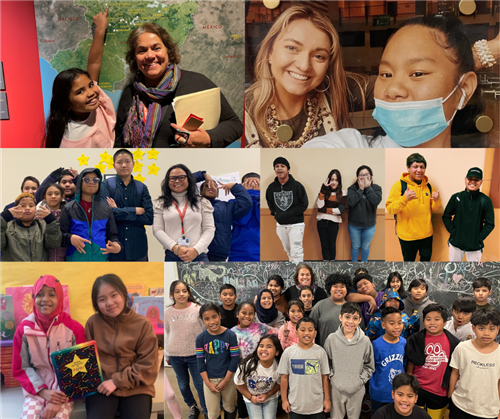- Spokane Public Schools
- More SPS Stories
Teachers: Why is education a human right?
Posted by Communications Staff on 1/24/2023

Five years ago, the United Nations General Assembly recognized education’s role in global peace and development by proclaiming Jan. 24 as International Day of Education.
In honor of the day, we asked a few of the teachers who work with our multilingual English learners to share why they believe education is a vital human right.
Jingle Gorton, English Language Development (ELD) teacher at Shaw Middle School, said education is a human right because “it allows members of underrepresented marginalized groups, like me, to break the cycle of deprivation and achieve dreams that I never imagined would be possible for me.”
“Todos merecen ser incluidos en el acceso a información, idioma y maestros de calidad,” said Kristen Parker, Joel E Ferris High School ELD and Math teacher. [“Everyone deserves to be included in access to information, language, and quality teachers.”]
“Education is a human right to empower each individual to reach his or her potential and engage in the community,” said Bemiss Elementary ELD teacher Laurie Manikowski.
Maria Esther Zamora, ELD teacher at Logan Elementary and Linwood Elementary School said the question offers an opportunity to recognize that education is key to accessing and understanding other human rights, like freedom of speech, freedom from slavery, and the right to work, among others.
“As an educator of color, first generation immigrant who works with refugees and immigrant students, my responsibility is to support education as a human right and to provide excellent education for all,” she said.
“That implies finding ways for my students to overcome the barriers of poverty and the opportunity gap while empowering them and their families to improve their lives.”
Advancing the right of education also promotes the positive change necessary to break negative cycles many immigrants have experienced from armed conflict, corruption, indifference, or inequalities, all of which “disrupted our right to dream with prosperity and the pursue of happiness.”
“We live in a diverse world with diverse perspectives,” said John R. Rogers High School ELD teacher Kailey Rice. “In order to grow in our future, we must understand those who we interact with and continue to yearn to learn. Schools are a beautiful place to practice this life skill.”
Kailey advises her school’s Amnesty International Club, made up of English Language Learners. She asked a few of her students to weigh in on the question.
Club president Nermin Omar, secretary Brijoshna Gurung, creative director Jiem Menke, Amnesty helper Abra Clanry, and treasurer Lino Keja said that while they discuss a variety of human rights issues, the right to an education is very important to them. Not only because it leads to a successful future and the ability to provide for a family, but because it allows for a greater understanding of the world around them.
“It is necessary that everyone is able to communicate with each other about many topics so that people feel equal to one another,” they wrote. “Education helps people to move forward and not repeat mistakes from the past.”
Recent
By Month
- April 2024
- March 2024
- February 2024
- January 2024
- November 2023
- October 2023
- September 2023
- August 2023
- July 2023
- June 2023
- May 2023
- April 2023
- March 2023
- February 2023
- January 2023
- December 2022
- November 2022
- October 2022
- September 2022
- August 2022
- July 2022
- June 2022
- May 2022
- April 2022
- March 2022
- February 2022
- January 2022
- December 2021
- November 2021
- October 2021
- September 2021
- August 2021
- July 2021
- June 2021
- May 2021
- April 2021
- March 2021
- February 2021
- December 2020
- November 2020
- October 2020
- March 2020
- November 2019
- October 2019
- May 2019
- April 2019
- February 2019
- January 2019
- November 2018
- October 2018
- September 2018

